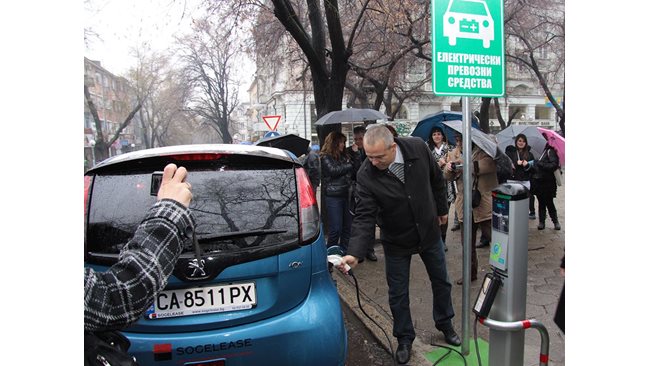–
–
Charging stations in Bulgaria are too few. PHOTO: Vanyo Stoilov
–
Their boom in Bulgaria remains for next year
The record rise in the price of one of the main materials for the production of batteries for electric cars – lithium, will lead to higher prices for electric cars, but in the short term. “Not only the increase in the price of raw materials such as lithium plays a role in raising car prices. Indeed, in the coming months, the extraction of this metal may have an impact on the pricing of electric cars. However, the trend for electric cars is different – to gradually become cheaper and equal the prices of cars with internal combustion engines and hybrids, “said Hrabrin Ivanchev, chairman of the AAP (Association of Automobile Manufacturers and their authorized representatives in Bulgaria).
The price of the lithium-ion battery has dropped dramatically in the last decade. In 2011, the battery cost over $ 1,000 per kilowatt-hour, and is now approaching $ 100. Even at such prices, electric cars remain on average 30% more expensive than cars that rely on internal combustion engines.
The price of lithium forms 12% of the price of the entire lithium-ion battery, and 14% of all extracted lithium goes to electric vehicles. This share is expected to increase to 40% by 2025.
By 2030, the growth of electric vehicles will provide more than 90% of lithium demand.
In 8 years, the automotive industry will consume 90% of all lithium produced.
The expected growth in sales of purely electric cars in Bulgaria is likely to happen, but next year, not now. As it is known, Bulgaria is applying for funding from the European Commission under the Environment Program for a bonus of 6135 euros for the purchase of an electric car and the return of a used petrol or diesel car over 15 years of age (with a lower eco-standard than Euro 4 ). Funding for the scraping program is for 4,000 cars on electricity.
According to Hrabrin Ivanchev, the scraping program will start in Bulgaria no earlier than the middle of the year. “Technically, there is still a lot of work to be done. It is unlikely that the scraping program for the purchase of electric new cars will start earlier in the summer, because there are many things to be clarified. For example, whether the old car will be returned to the designated place directly by the owner or by the importer, “Ivanchev told 24 Chassa.
Last year, about 300 new electric cars were sold in Bulgaria, and dealers expect the number to double by next year. Due to the semiconductor crisis, manufacturers will not be able to order any new cars, not just pure electric ones, and this will affect the growth of our market in the coming months. The chip crisis is expected to end in the middle of the year, when two semiconductor gigafactories will start operating in Europe to solve the supply problem.
“Solving the problem of production and the lack of semiconductors will coincide with the bonus program for the purchase of electric cars in our country. So we expect a really serious increase in the demand for new electric cars next year, “said Ivanchev.
Until then, dealers hope to solve the problem with the charging infrastructure of these electric cars.
Bulgaria is in last place in terms of number of chargers
stations for electric cars on 100 km of roads. This is according to statistics from the Association of European Automobile Manufacturers (ACEA). In our country there are an average of 0.8 charging stations per 100 km, and the situation is worse only in Cyprus, Estonia, Hungary, Latvia, Poland, Romania, Lithuania and Greece.
Bulgaria is among the 10 countries in the EU that do not even have one charger for every 100 kilometers of key roads (highways, intercity and urban). All these countries also have a market share of electric cars below 3% (except Hungary).
18 EU Member States have less than 5 charging stations per 100 km road, and only four have more than 10 chargers.
As part of its Fit for 55 climate package, published in July, the European Commission has proposed
carbon dioxide emissions from new cars to be 55% lower
from 2021 to 2030. European carmakers will have to launch millions of electrically powered cars in the coming years to achieve this challenging new goal.
“Consumers will not be able to switch to zero-emission vehicles if there are not enough charging stations on the roads they drive on,” warned Eric-Mark Huitema, CEO of ACEA.
“For example, if citizens of Greece, Lithuania, Poland or Romania still have to travel 200 km or more to find a charger, we cannot expect them to be ready to buy an electric car,” Huitema said.
The contrast between the country with the most chargers, the Netherlands (47.5 per 100 km) and large countries such as Poland, which is eight times larger, but with only one power plant every 250 km, is striking.
–


